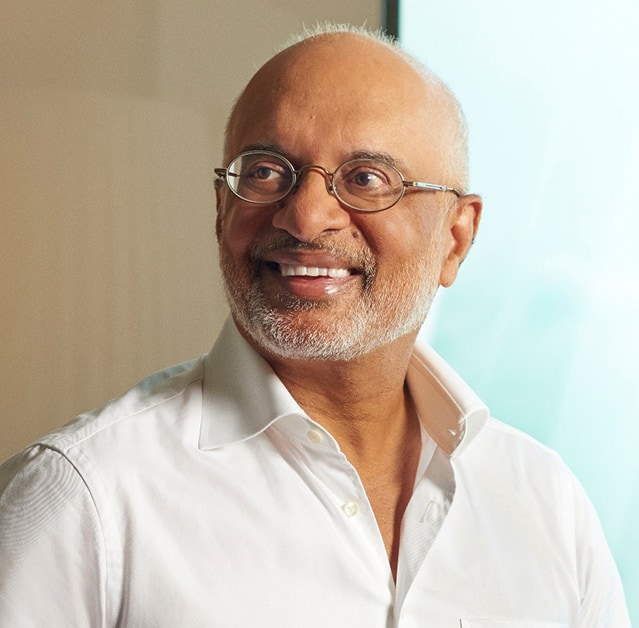Piyush Gupta, CEO of DBS, shares his thoughts regarding the future of banking and corporate finance.

Global Finance: Which qualities differentiate DBS from its competitors?
Piyush Gupta: The first is that, as a bank, purpose is deeply embedded in our DNA. This stems from the fact that DBS was established in 1968, just three years after Singapore became an independent nation, to finance the young nation’s industrialization. The sense in DBS—that we must do real things for real people—remains the defining characteristic of our culture even today. As an example, in Singapore, DBS is the only bank to automatically open bank accounts for incoming migrant workers because we have a mandate to bank the underserved.
The second is that DBS embarked on a wide-scale digital transformation in 2014, which was early compared to many of our peers. Consequently, we are more like a technology company offering financial services than a bank. Today, DBS employs 12,000 technologists, exceeding the number of bankers we have. We are an artificial-intelligence-fueled bank, using AI and machine learning to provide customers with personalized solutions in context, predict employee attrition and detect fraud risks. In addition, DBS offers the largest set of bank-delivered APIs globally, helping customers enhance efficiency and transforming their bank interactions in a truly digital workflow. More recently, we have set up multiple new businesses that harness new technologies. These include the DBS Digital Exchange [DDEx], which offers tokenization, trading and custody services of digital assets, and Partior, a blockchain-based cross-border clearing and settlement provider.
Finally, although DBS has global stature, having been named Best Bank in the World multiple times, we are Goldilocks-size in headcount; that is, big enough to matter, but small enough to be nimble. This is important at a time of exponential technological change and significant macroeconomic uncertainty. Underlining our ability to move fast, we made several acquisitions over the past two years in key Asian markets like India and Taiwan. We believe these moves will position us well for the future.
GF: DBS is a significant player in environmental, social and governance (ESG) initiatives. Is that market growing as fast as expected?
Gupta: Absolutely. Decarbonization is a generation-defining business opportunity. Global investment in clean energy alone will need to triple to an estimated 3.5 trillion Singapore dollars [about $2.5 trillion] annually by 2030, and nearly every industry will need a period of heightened investment.
On DBS’ part, the bank had originally set a target to do SGD50 billion in sustainability-linked loans by 2024. As of June this year, however, we had loaned SGD52.7 billion, exceeding our targets almost two years ahead of time.
Recently, DBS announced a comprehensive set of decarbonization targets across multiple sectors—such as aviation, real estate, power, as well as oil and gas—that will take our financed emissions to net zero by 2050. This requires us to proactively work with our clients to pivot their business strategies and accelerate their transition journeys. We are confident from our conversations with them that many will be willing to do so. When we first started providing sustainability financing some years back, we had to incentivize prospective clients to come along in the journey through discounted pricing. Today, those incentives are no longer required, as they, too, believe in the importance of transitioning to a lower-carbon future.
GF: What global changes do you see in the corporate finance market in the next 12 to 24 months?
Gupta: Geopolitical tensions and the risk of a global recession due to rising interest rates stemming from inflationary concerns are expected to weigh on debt and equity markets over the next 12 to 24 months. Many equity issuers are readying themselves to come to market; however, windows of opportunity are narrow, with broader investor sentiment likely to remain risk-off for a while.
On the brighter side, ESG bonds, especially green bonds, continue to make up a growing proportion of new bonds issued. We expect this trend to continue, as corporates increasingly give weight to ESG matters. Based on a DBS-commissioned Climate Bonds Initiative study, more than $900 billion worth of bonds’ underlying activities today are already climate-aligned, and almost 50% of this comes from Asia-Pacific issuers. If a good proportion of these are refinanced as green bonds, the business opportunity arising from this will be exponential.
In addition, we expect the pace of asset digitalization/tokenization and transformation efforts in capital markets to continue to accelerate. With tokenization, any asset—from real estate to paintings—can be fractionalized to immense minuteness, while digital platforms will continue to pose further disruption threats. All of these have the potential to reshape capital markets, opening up alternative fundraising avenues for corporates to tap private capital markets and democratizing investor access to equity and debt products.
GF: How is DBS addressing those concerns—and opportunities?
Gupta: Given the volatile market environment and risk-off sentiment, we are staying close to our clients, who are looking to tap the capital markets when windows of opportunity open.
On the ESG front, we see massive opportunity. As the only Asian bank that is active in the region’s G3 issuance space, DBS has been instrumental in driving Asia’s ESG issuances. In 2021, we raised over SGD23 billion in ESG bonds, and despite a challenging debt market backdrop, we successfully executed another SGD14.9 billion in ESG bonds in the first half of 2022. We will continue to work closely with clients who want to do more in the space.
On the asset digitalization front, DBS has experience in deal-making, issuing its first digital bond by way of a Security Token Offering in May 2021 through the DBS Digital Exchange. Our award-winning FIX Marketplace mitigates the risks of disruption by enabling automated and more-inclusive capital markets access for issuers and investors. Together, the bank can facilitate capital-raising for our clients via integrated solutions across the entire digital-asset value chain, from deal origination to tokenization, listing, trading and custody.



